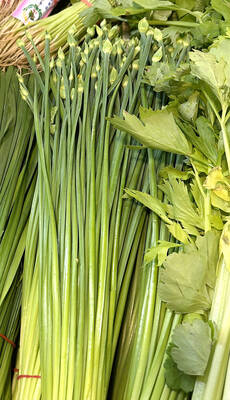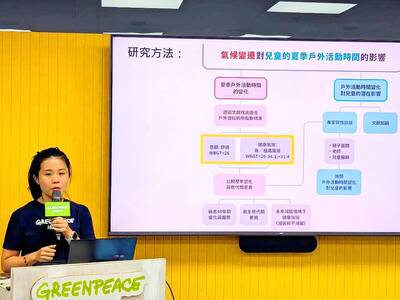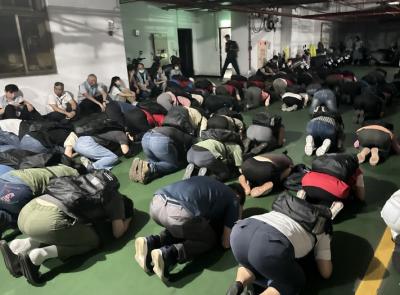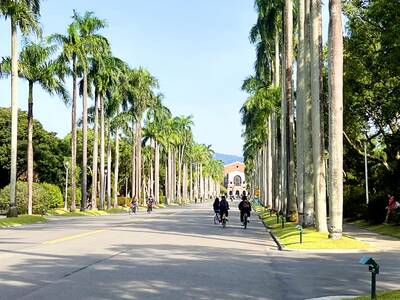Chinese President Hu Jintao (
"Because the US government's stance is firm, President [George W.] Bush did not let China score points on the Taiwan issue during the meeting," Chen said. "President Bush did not say anything to surprise us and for that we are very grateful."
Chen told the Journal that the Bush-Hu meeting highlighted four issues -- human rights, "one China," Taiwan and economics.
First, Chen said, it was a serious concern when a well-educated Chinese woman, Wang Wenyi (
Her protest reflects not only China's suppression of the Falun Gong and religious freedom but also its notorious human-rights record, Chen said.
Second, Chen said he thinks it was not an innocent flub when the White House announcer mixed up the national anthem of the Republic of China (ROC) with that of the People's Republic of China (PRC).
The mistake was made, Chen said, because of the "one China" concept, which confuses the international community.
Third, the US and China have different attitudes toward Taiwan although they both embrace "one China," Chen said.
While China "strongly opposes" Taiwan independence and sets unification as its ultimate goal, Chen said the US government "does not support" Taiwan independence but it does not preset any stance or conclusion for Taiwan's future.
Finally, he said it was debatable whether the Bush-Hu meeting has had any positive impact on the two countries' trade imbalance.
He said people will have to pay attention to China's impact on the global economy when the "sleeping giant" awakens.
Despite China's indifference to Taiwan's goodwill gestures and Beijing's passage of an "Anti-Secession" Law, Chen said his government is still willing to engage in dialogue with Beijing under the principles of sovereignty, democracy, peace and equality.
He said he hopes China would respect and accept the fact that the ROC is an independent, sovereign state and that it would respect the free choice of the 23 million people of Taiwan about the country's future and cross-strait relations.
The president called on Beijing to resolve cross-strait disputes through government-to-government contacts and dialogue, lambasting the Chinese Communist Party (CCP) and Chinese Nationalist Party (KMT) for joining forces to seize power in 2008.
He said that after he was elected in 2000, China waiting for the opposition parties to succeed with their impeachment campaign. After he won re-election in 2004, China waited for him to be unseated by two lawsuits filed by the losing pair, former KMT chairman Lien Chan (連戰) and People First Party (PFP) Chairman James Soong (宋楚瑜).
Now, China is teaming up with the opposition to engage in a "soft decapitation" campaign to vilify his government and its leaders, he said.
"Even if the KMT retakes power in 2008, I don't believe cross-strait relations will improve," he said.
Chen, however, expressed appreciation to KMT Chairman Ma Ying-jeou (
Chen said that he realizes that it may take a while before the legislature gives the arms budget the go-ahead, but if lawmakers keep trying, he anticipates the legislature reaching a consensus on the issue by agreeing to at least part of the project.
Stressing that Taiwan will never launch the first strike and start a war in the Taiwan Strait, Chen said the country must strengthen its national defense capability.
also see story:
Editorial: President Chen, time to fight back

The Taipei Department of Health’s latest inspection of fresh fruit and vegetables sold in local markets revealed a 25 percent failure rate, with most contraventions involving excessive pesticide residues, while two durians were also found to contain heavy metal cadmium at levels exceeding safety limits. Health Food and Drug Division Director Lin Kuan-chen (林冠蓁) yesterday said the agency routinely conducts inspections of fresh produce sold at traditional markets, supermarkets, hypermarkets, retail outlets and restaurants, testing for pesticide residues and other harmful substances. In its most recent inspection, conducted in May, the department randomly collected 52 samples from various locations, with testing showing

The government should improve children’s outdoor spaces and accelerate carbon reduction programs, as the risk of heat-related injury due to high summer temperatures rises each year, Greenpeace told a news conference yesterday. Greenpeace examined summer temperatures in Taipei, New Taipei City, Taoyuan, Hsinchu City, Taichung, Tainan and Kaohsiung to determine the effects of high temperatures and climate change on children’s outdoor activities, citing data garnered by China Medical University, which defines a wet-bulb globe temperature (WBGT) of 29°C or higher as posing the risk of heat-related injury. According to the Central Weather Administration, WBGT, commonly referred to as the heat index, estimates

Taipei and other northern cities are to host air-raid drills from 1:30pm to 2pm tomorrow as part of urban resilience drills held alongside the Han Kuang exercises, Taiwan’s largest annual military exercises. Taipei, New Taipei City, Keelung, Taoyuan, Yilan County, Hsinchu City and Hsinchu County are to hold the annual Wanan air defense exercise tomorrow, following similar drills held in central and southern Taiwan yesterday and today respectively. The Taipei Mass Rapid Transit (MRT) and Maokong Gondola are to run as usual, although stations and passenger parking lots would have an “entry only, no exit” policy once air raid sirens sound, Taipei

Taipei placed 14th in the Quacquarelli Symonds (QS) Best Student Cities 2026 list, its highest ever, according to results released yesterday. With an overall score of 89.1, the city climbed 12 places from the previous year, surpassing its previous best ranking of 17th in 2019. Taipei is “one of Asia’s leading higher-education hubs,” with strong employer activity scores and students “enjoying their experience of the city and often keen to stay after graduation,” a QS staff writer said. In addition to Taipei, Hsinchu (71st), Tainan (92nd), Taichung (113th) and Taoyuan (130th) also made QS’ list of the top 150 student cities. Hsinchu showed the